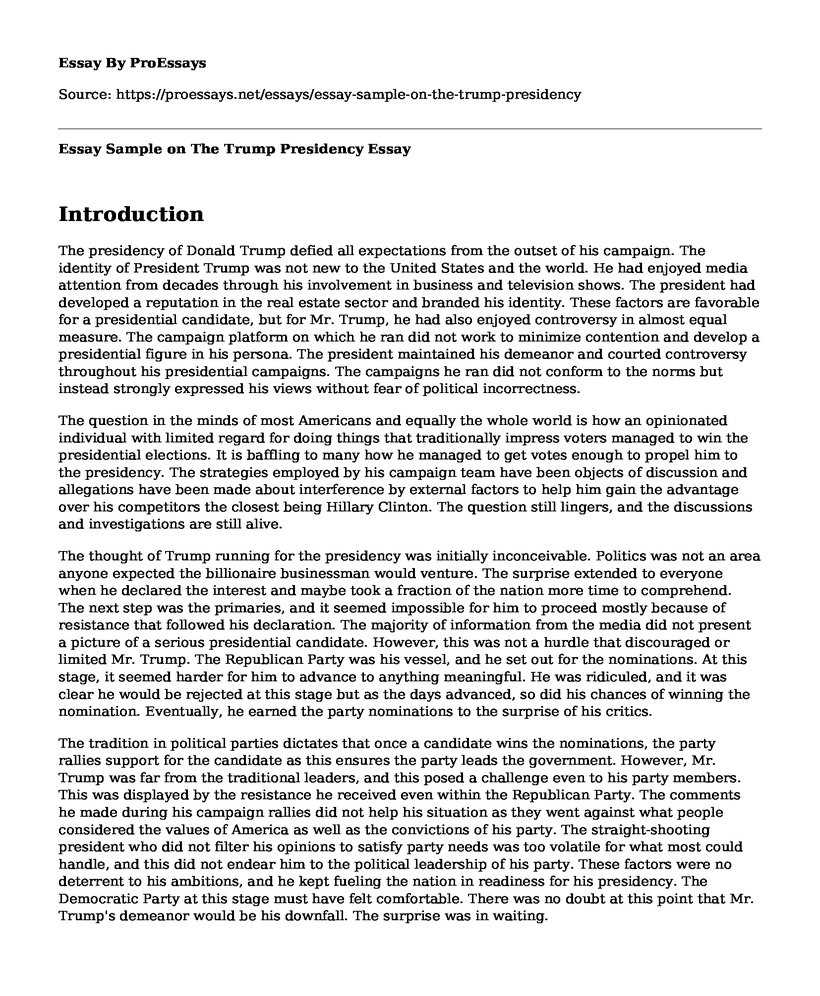Introduction
The presidency of Donald Trump defied all expectations from the outset of his campaign. The identity of President Trump was not new to the United States and the world. He had enjoyed media attention from decades through his involvement in business and television shows. The president had developed a reputation in the real estate sector and branded his identity. These factors are favorable for a presidential candidate, but for Mr. Trump, he had also enjoyed controversy in almost equal measure. The campaign platform on which he ran did not work to minimize contention and develop a presidential figure in his persona. The president maintained his demeanor and courted controversy throughout his presidential campaigns. The campaigns he ran did not conform to the norms but instead strongly expressed his views without fear of political incorrectness.
The question in the minds of most Americans and equally the whole world is how an opinionated individual with limited regard for doing things that traditionally impress voters managed to win the presidential elections. It is baffling to many how he managed to get votes enough to propel him to the presidency. The strategies employed by his campaign team have been objects of discussion and allegations have been made about interference by external factors to help him gain the advantage over his competitors the closest being Hillary Clinton. The question still lingers, and the discussions and investigations are still alive.
The thought of Trump running for the presidency was initially inconceivable. Politics was not an area anyone expected the billionaire businessman would venture. The surprise extended to everyone when he declared the interest and maybe took a fraction of the nation more time to comprehend. The next step was the primaries, and it seemed impossible for him to proceed mostly because of resistance that followed his declaration. The majority of information from the media did not present a picture of a serious presidential candidate. However, this was not a hurdle that discouraged or limited Mr. Trump. The Republican Party was his vessel, and he set out for the nominations. At this stage, it seemed harder for him to advance to anything meaningful. He was ridiculed, and it was clear he would be rejected at this stage but as the days advanced, so did his chances of winning the nomination. Eventually, he earned the party nominations to the surprise of his critics.
The tradition in political parties dictates that once a candidate wins the nominations, the party rallies support for the candidate as this ensures the party leads the government. However, Mr. Trump was far from the traditional leaders, and this posed a challenge even to his party members. This was displayed by the resistance he received even within the Republican Party. The comments he made during his campaign rallies did not help his situation as they went against what people considered the values of America as well as the convictions of his party. The straight-shooting president who did not filter his opinions to satisfy party needs was too volatile for what most could handle, and this did not endear him to the political leadership of his party. These factors were no deterrent to his ambitions, and he kept fueling the nation in readiness for his presidency. The Democratic Party at this stage must have felt comfortable. There was no doubt at this point that Mr. Trump's demeanor would be his downfall. The surprise was in waiting.
The days leading to the election were dramatic. The media must have had the most fun covering this period as there was always a story to tell. The campaigns were heated, and Mr. Trump kept it interesting. The Democratic Party capitalized on the antagonism created by Trump's statements during the campaign. The president remarks appeared borderline racist and intolerant to immigrants. The United States is considered the free world and consequently enjoys a large population of immigrants. Comments deemed offensive to immigrants are unlikely pronunciations by presidential candidates, but these did not stop him from speaking out his convictions.
The Democratic Party was affected when leaked emails by Hillary Clinton were disclosed to the nation. The credibility of their candidate was questioned, and this alleviated Trump's position. Mr. Trump finally had ammunition against the Democratic Party candidate, and he capitalized. The polls however still maintained a Hillary Clinton victory. Progressively, Mr. Trump improved in the polls but at no point did he surpass Hillary Clinton. The elections came, and history was made. Trump was elected President of the United States but did not win the popular vote. The world was shaken by the results but in an election conducted fairly, and the opponent concedes defeat, the only options left were to embrace the new leader and possibly the most powerful man on the planet.
Conclusion
The subject of the essay is how the President managed to win the presidency. The strategies used by the campaign team, the circumstances surrounding the victory and any other factor that contributed to his Presidency will be analyzed to provide understanding into how an unexpected candidate managed his campaign and achieved his ambitions. The essay will also examine how the billionaire president managed to acquire support from diversified groups within the country notably the poor.
Cite this page
Essay Sample on The Trump Presidency. (2022, Nov 02). Retrieved from https://proessays.net/essays/essay-sample-on-the-trump-presidency
If you are the original author of this essay and no longer wish to have it published on the ProEssays website, please click below to request its removal:
- Impact of the Modern Federal Government - Essay Sample
- The Role of Diplomacy in International Relations: The Case of America and Russia
- Neural Network Application in Insurance Industry Essay Example
- US Government: Improving Quality of Life for All Citizens - Research Paper
- Paper Example on Struggle for Power & Supremacy: Who's Ahead?
- Paper Sample on Deficit-Cutting Reforms: How ACA Helps Improve Healthcare Access
- Free Report Sample on Managing Info for Optimal Results







